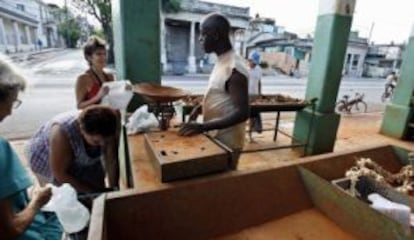Ups and downs for the new Cuban entrepreneur
Private businesses employ 450,000 people and stimulate a “capitalist” mindset


As the topless girl crosses the street, she draws the attention of the prosecutor. He stops his car and takes down the address of the business she has just left. It is a bar that belongs to a well-known volleyball player and her Italian husband. It is 8am in Havana.
“The prosecutor must have been surprised,” says one foreign businessman. The official was so shocked that he called the police and asked them to shut down the bar on the grounds of public indecency.
The girl with the exposed chest and her pack of night owls had been out until the early hours. They were coming from one of the pubs that has opened up on the residential Quinta Avenida. The bar is on the first floor of a home. The decor includes a shot of the Malecón and other emblematic photographs of Havana. These businesses have been cropping up since the government loosened restrictions on privately held enterprises three years ago.
The liberalization of the Cuban economy has led to a capitalist mindset among those who manage new cafeterias, restaurants, pizzerias, studios, co-ops, artisan shops, hair salons and gyms. About 450,000 Cubans – nine percent of the working population – have launched private businesses in 200 sectors. Their endeavors include everything from real estate, tailoring and carpentry, to photography and taxis.
The Communist Party of Cuba (PCC) still holds a monopoly in the economy, but the government has grown much more lenient on private businesses who commit infractions, especially as new entrepreneurs take sharp turns to reach their goals. But not all businesses are thriving. Thousands have closed after opening with great enthusiasm but little research about the viability of their chosen trade. Some have also failed because of the limited purchasing power of their clientele. The majority of Cuba’s 11 million citizens earn 500 pesos, around €25, each month. New businesses are targeting the fellow who holds divisas or peso convertible (CUC), Cuba's second official currency, which is used to convert foreign money for use on the island and is equivalent to the US dollar. The two-currency system represents a kind of Gordian knot that locks down the economic reforms. Until the government resolves the situation, those who earn pesos will continue to live a hard life in Cuba.
The Italian man and his volleyball wife were getting rich at their 24-hour bar but they ended up at the police station. After the raid, some of the dancers put on some religious music as a preventive measure. They relaxed back into the party atmosphere once the officers had cleared out. “Here they let you do what you want until something happens, and then it’s all over,” my companion says.
The Communist Party has a monopoly, but government is now more lenient on businesses who commit infractions
Young middle class patrons mingle merrily now. They have imported cellphones, brand-name clothing and they use small euro bills. Politics is not a priority for them because ideology and related concepts are non-transferrable government monopolies. Not even the man who imparts his knowledge to me about cigars wants to talk about multi-party democracies. “This is not what this is for, friend. How many cigars do you want? I’ll give you a good price.”
The modernization Raúl Castro promoted at the sixth congress of the party in 2011 does not give away any political power. But, those who are praying for political freedom say the modern economy is taking on a life of its own and it may crack open the single-party system. Given the current situation in Cuba – anti-government protests do not exist and when they do spring up, they are suppressed – one can only wait for answers to those prayers or for an improbable act of generosity from the regime.
Meanwhile, the government has different aims. Officials say they want to promote economic wellbeing, reshuffle half-a-million workers who lost their jobs when their companies failed and another half-a-million who currently hold precarious positions. The state still employs four of the five million workers on the island. Their other mission is to reduce the amount the nation spends on food. It currently imports 60 percent of its stock, spending about €1.8 billion a year.
Last year, the administration converted 200 small and mid-size companies into cooperatives. It also raised taxes on private businesses by 18 percent. This increase accounts for about 2 percent of the budget. Contrary to the outdated egalitarian rhetoric, the Castro regime allows moderate wealth acquisition to those few who are willing to take risks with their own money. Some borrow money from family members who live in the United States, Spain or in other countries. Remittances to the island reach up to €2 billion each year.
By the end of 2013, about 2,000 restaurants were using the divisa, the stronger currency that is equivalent to the US dollar, and about 7,250 rooms had been rented.
Ana Sarabig Domínguez raised about € 30,000 to open up Sancho Panza in El Vedado de La Habana two years ago. The restaurant, which serves a variety of Creole dishes, is doing well. Sarabig Domínguez has 18 employees. “The inspectors asks us for bills that we can’t procure at times because those who sell us the fish, the meat or the vegetables don’t issue them,” says Alina, the accountant.
Only those who have lived abroad and those who earn divisas con buy homes, cars and finance businesses. The rest of the Cuban people must buy credit from the Central Bank of Cuba. Only 550 entrepreneurs took out loans. Alejandro, a 50-year-old chauffeur, chose to forgo the loans and works without a license.
It’s 9.30pm and I get into his almendrón, an ailing 1956 Ford. We have no clear destination. Alejandro charges 10-20 Cuban pesos (€0.20-0.60) depending on distance.
“How’s it going?” The passengers – a couple, their daughter and the grandfather – strike up a conversation. “It’s going,” Alejandro says. “I make 1,000 pesos every day but I pay taxes several times a year. And then there is the gas. The tires get ripped because of the potholes. The lights, general wear and tear and whatever else comes up. That doesn’t leave me much.” He complains about the competition, because 11 percent of the licensed drivers work as both taxis and chauffeurs. But, he says, his independence is worth it.
Every day, Alejandro and his Ford cruise the populous Centro Havana district in search of passengers. A legion of Chryslers, Mercurys, Chevrolets and other relics court the same clients. About 8,000 chauffeurs operate in Havana. Hundreds work as limousines for weddings, parties and tourists.
When Cuba welcomed this embryonic capitalist market, it also took on some collateral damage: growing social inequalities, the third party mafias who take advantage when individuals need to transfer ownership of homes or cars, and contracts that falsify quantities and transactions to evade taxes. “There are middlemen who are getting rich,” an official source says.
The officer from the patrol car who stopped me one night for driving in the wrong direction also wants his share. The circumlocutions with the policeman ended when a man in civilian clothes appeared. He invited me to get into his car. “The ticket is 60 CUC but for 20 CUC you can go. Leave the money on the back seat and get out.”
I was an accomplice in this crime. I did what he asked.
The maneuver reminded me of the routine the Mexican police capo, Arturo “Negro” Durazo (1924-2000) used when he was taking a break from extortion at gunpoint. When the victims arrived at his office, Durazo would open a desk drawer. Then, he would leave the room. The blackmailed individual would drop in wads of cash, hundreds in gold, important signatures and other precious objects. Although they are more sophisticated now, these legendary methods are still used in Latin America, from Río Grande to Tierra del Fuego.
Translation: Dyane Jean François
Experimenting in Artemisa
We take a road trip to go and see the depoliticized economy in action, the economy that is moving toward a more entrepreneurial focus. The province of Artemisa, about 60 kilometers from Havana, is a test case for the economic decentralization that is meant to take place throughout Cuba. “It’s about doing more with less,” the government spokesmen in Artemisa say.
Half-a-million residents live in Artemisa. There are 21,500 entrepreneurs, many of whom are members of cooperatives smaller than the one that Israel Martin directs.
Martin’s company grows sugarcane on 1,173 hectares of land. The plantation also houses a cattle ranch for milk and meat production.
Betancourt Rodríguez leads 171 associates in a co-op. Some of them worked in the now decimated sugarcane sector. Another 34 peasants recently joined after the government let them lease out the land from 90 farms. “We all have to answer before the 171-member assembly every month,” Martin says. “And here in the countryside we work a lot. My father starts at 4.30am and I start at 6am.”
There is also a cooperative that lives off of a much celebrated banana shake. Nearby, another co-op recycles bottles and iron scraps.
Lucilo Valdés is 63 years old. He is a musician but right now he is on medical leave. To save up for his retirement, he picks up castoffs and sells them at the co-op. “It’s not much. So, you know, if you have $40 and you want to give me a gift, great.”
Tu suscripción se está usando en otro dispositivo
¿Quieres añadir otro usuario a tu suscripción?
Si continúas leyendo en este dispositivo, no se podrá leer en el otro.
FlechaTu suscripción se está usando en otro dispositivo y solo puedes acceder a EL PAÍS desde un dispositivo a la vez.
Si quieres compartir tu cuenta, cambia tu suscripción a la modalidad Premium, así podrás añadir otro usuario. Cada uno accederá con su propia cuenta de email, lo que os permitirá personalizar vuestra experiencia en EL PAÍS.
¿Tienes una suscripción de empresa? Accede aquí para contratar más cuentas.
En el caso de no saber quién está usando tu cuenta, te recomendamos cambiar tu contraseña aquí.
Si decides continuar compartiendo tu cuenta, este mensaje se mostrará en tu dispositivo y en el de la otra persona que está usando tu cuenta de forma indefinida, afectando a tu experiencia de lectura. Puedes consultar aquí los términos y condiciones de la suscripción digital.








































